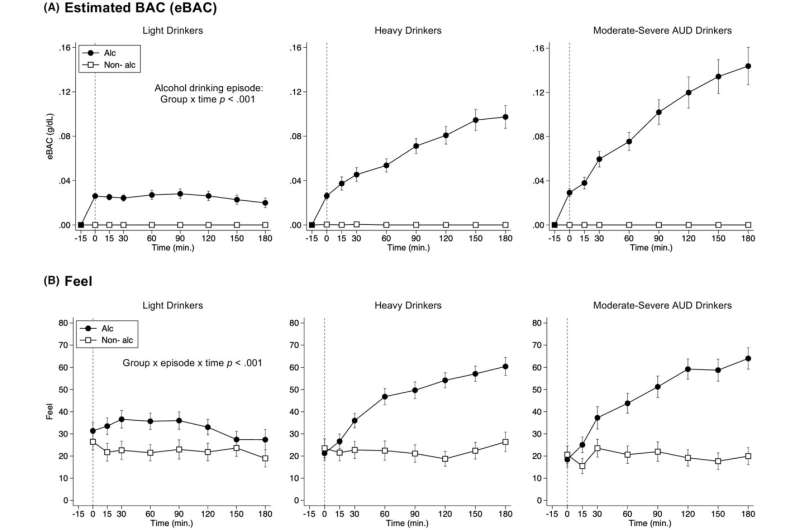This article has been reviewed according to Science X's editorial process and policies. Editors have highlighted the following attributes while ensuring the content's credibility:
fact-checked
peer-reviewed publication
trusted source
proofread
Greater enjoyment, not greater tolerance, may motivate heavy drinking among high-risk drinkers

People who drink heavily experience heightened pleasurable effects throughout a drinking episode, which may be what motivates them to continue drinking, and not, as is commonly believed, that they require more alcohol in order to experience these effects. So suggests a first-of-its-kind study of real-world, real-time drinking experiences and motivations of different types of drinkers just published in Alcohol: Clinical and Experimental Research.
Researchers found that high-risk drinkers felt greater positive effects of alcohol compared to light drinkers, suggesting they are more sensitive to alcohol stimulation and reward. Sedation did not differ across groups. These findings held even when accounting for differences in alcohol consumption across the groups.
Light drinkers reported feeling the effects of their drinking more than other groups in the first fifteen minutes of a drinking episode. Heavy drinkers felt the drinks more one to three hours after they began drinking, and drinkers with moderate to severe alcohol use disorder reported greater feeling at 90 minutes to three hours after they began drinking.
Respectively, the groups averaged three, seven, and nine drinks per drinking episode. Both high-risk drinking groups drank throughout the three-hour period, with half of heavy drinkers and two-thirds of drinkers with moderate to severe alcohol use disorder drinking beyond three hours.
Researchers used a smartphone-based assessment tool to collect real-time feedback from participants about their alcohol use and their drinking experiences and motivations throughout a drinking episode, as well as before and after it. One hundred drinkers categorized as either light drinkers, heavy drinkers, or drinkers with moderate to severe alcohol use disorder were included in the study.
As they started drinking, and at seven different intervals in the first three hours after they began drinking, participants completed smartphone-based questionnaires about how many drinks they had consumed, whether they were feeling stimulated or sedated, how much they 'felt' the effects of the drink, whether they liked the effects, and whether they wanted more.
The study's high response rate, about 90%, supports the utility of the smartphone-based assessment tool called HR-EMA with light drinkers and high-risk drinkers. HR-EMA, or High-Resolution Ecological Momentary Assessment, is designed to capture data in real-time in the participant's natural environment.
The study estimated Blood Alcohol Concentration (BAC), factoring in participants' weight, gender, self-reported number of drinks, and average metabolism rate; emerging biosensor technologies may be able to provide more accurate BAC data for future studies. Additionally, the authors recommend that future studies involve a wider range of individuals, including people with psychiatric conditions.
More information: Daniel J. Fridberg et al, Assessing real‐time positive subjective effects of alcohol using high‐resolution ecological momentary assessment in risky versus light drinkers, Alcoholism: Clinical and Experimental Research (2023). DOI: 10.1111/acer.15130


















